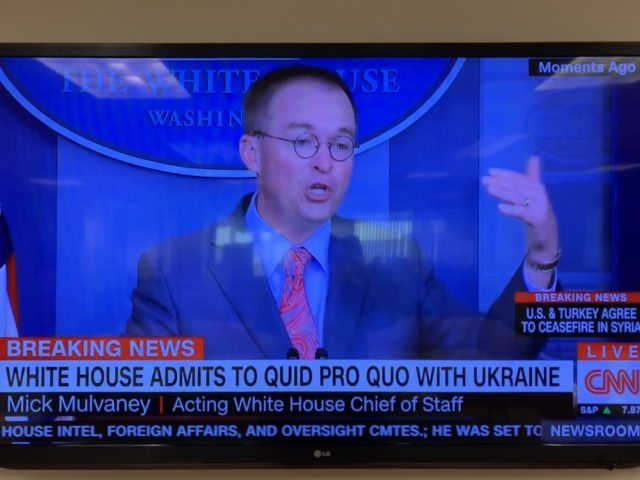CNN claimed Thursday that the White House “admits to quid pro quo with Ukraine.”
That appeared to be the opposite, in fact, of what happened during a press conference with acting White House Chief of Staff Mick Mulvaney.
Mulvaney told reporters that there had been no quid pro quo, as described by those pursuing his impeachment — that President Donald Trump had not withheld aid from Ukraine until it agreed to investigate his potential 2020 presidential rival, former Vice President Joe Biden.
What Mulvaney actually said was that the Trump administration had initially withheld funding from Ukraine for a variety of reasons, including the fact that Europe was not providing enough funding for military aid. Another reason, he said, was suspicion of past corruption in Ukraine — which included Ukraine’s possible role in interfering in the 2016 presidential election, including its possible possession of a Democratic National Committee server.
Mulvaney said: “The look back to what happened in 2016 certainly was part of the things [President Trump] was worried about in corruption with that nation. That is absolutely appropriate.”
When a reporter said that was a “quid pro quo,” Mulvaney objected that it was routine for the U.S. to withhold funding from foreign nations all the time. He gave an example from this week: the U.S. had withheld aid from the “Northern Triangle” nations — El Salvador, Honduras, and Guatemala — until they agreed to help stop migration.
Mulvaney later added: “The money held up had absolutely nothing to do with Biden.”
When another reporter used the term “quid pro quo,” Mulvaney objected:
Those are the terms you use. Go look at what [U.S. Ambassador to the European Union] Gordon Sondland said today in his testimony — was that, I think, in his opening statement — he said something along the lines of, they were trying to get the “deliverable,” and the deliverable was a statement by the Ukraine about how they were going to deal with corruption. Okay? Go read his testimony, if you haven’t already. And what he says, and he’s right, that’s absolutely ordinary course of business. This is what you do. When you have someone come to the White House — when you either arrange a visit for the president, you have a phone call with the president — a lot of times we use that as the opportunity to get them to make a statement of their policy, or to announce something that they are going to do. It’s one of the reasons you can sort of announce that on the phone call or at the meeting. This is the ordinary course of foreign policy.
As Mulvaney was speaking, Vice President Mike Pence was preparing to announce a cease-fire agreement with Turkey in which the U.S. would withhold further economic sanctions once Turkey had allowed Kurdish fighters to withdraw.
The White House has insisted throughout the Ukraine controversy that there was no “quid pro quo” in relation to a request by the president that the Ukrainian government look into possible corruption involving Biden’s son, Hunter Biden, and the former vice president’s past pressure to fire a prosecutor who had investigated his son’s company.
Mulvaney did not admit that there had been a “quid pro quo,” but said only that the U.S. had attached ordinary conditions to funding, including a demand that Ukraine commit to fight corruption and investigate past interference in a U.S. election.
White House correspondent Jim Acosta later told viewers, as anchor Brooke Baldwin shook her head disapprovingly, “Mick Mulvaney was asked at one point whether or not this sounds like a quid pro quo and he said, we do this all the time.”
He continued: “Now, the reason I said it’s sounds like this is a ‘catch me if you can’ administration is because essentially what Mick Mulvaney is laying out is the same legal argument laid out by former President [Richard] Nixon in that famous interview that he did after his presidency, that if the president does it, it’s not illegal.”
That is not what Mulvaney said. In fact, Mulvaney pointed out that the White House had referred the transcript of Trump’s phone call with the Ukrainian president to the Department of Justice for criminal investigation — one that had cleared the president. He also noted that the White House had released the transcript publicly without fear of any impropriety.
Acosta went on: “He [Mulvaney] did try to draw the line that, well, this didn’t have anything to do with Joe Biden. That’s baloney, Brooke. Because as you just pointed out a few moments ago, it’s in the transcript.”
However, it has already been widely reported that Ukraine did not know any aid had been suspended until several weeks after the July 25 telephone call.
Other outlets took a different approach from that of CNN.
Politico, for example, reported: “Mulvaney appears to confirm Ukraine aid was contingent upon probe into 2016 election.” which is accurate. It also published a vaguer headline: “Mulvaney appears to confirm Ukraine aid was tied to political probe.” It did not conclude, however, that the White House had admitted to a “quid pro quo.”
Update: Mulvaney clarified Thursday evening that there was never any “quid pro quo” with Ukraine, adding that no funding had been withheld for reasons related to a suspected Democratic National Committee communications server (that was said, at the time, to have been hacked by Russians, but was never handed to the FBI).
Joel B. Pollak is Senior Editor-at-Large at Breitbart News. He earned an A.B. in Social Studies and Environmental Science and Public Policy from Harvard College, and a J.D. from Harvard Law School. He is a winner of the 2018 Robert Novak Journalism Alumni Fellowship. He is also the co-author of How Trump Won: The Inside Story of a Revolution, which is available from Regnery. Follow him on Twitter at @joelpollak.

COMMENTS
Please let us know if you're having issues with commenting.